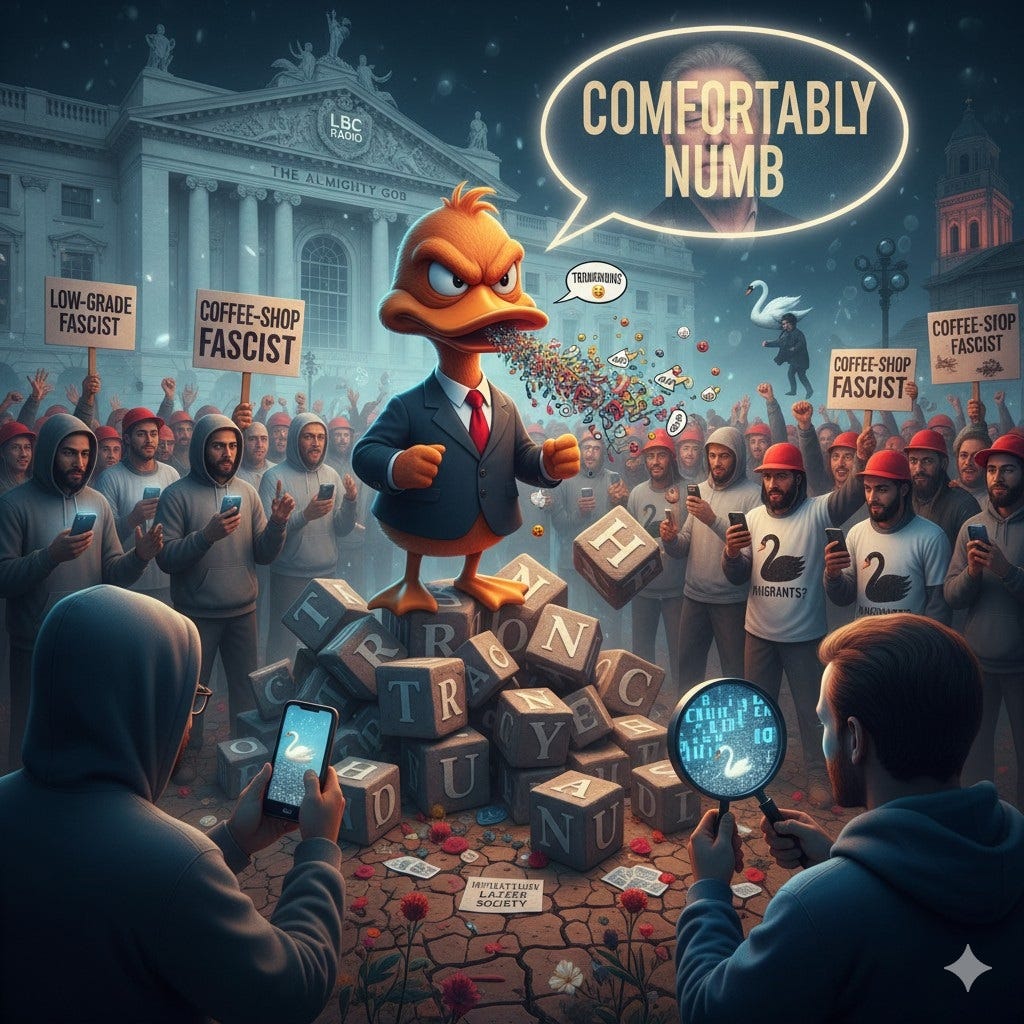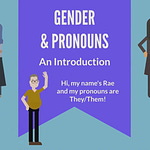Well, that’s it then. I’m officially a ‘fascist.’ And why? Because someone on the internet said I am, and apparently, that’s all it takes to make it official in their eyes. It’s the new rule of engagement, you know? It’s like me reporting that the NHS will, from now on, be using a smaller font just to reduce the size of its waiting list. And god help anyone who happened to shake Epstein’s hand in passing, because they’d be a child sex abuser automatically.
The Great Fascist Groupism of 2025.
Being a run-of-the-mill ‘fascist’ is so very last week. This label has now given rise to sub-categories, each designed to further fragment our already battered English language. There’s the “Low-Grade Fascist” for people who just don’t smile enough in public, enforcing their rule with nothing but a disapproving glance. Then you have the “Coffee-Shop Fascist,” reserved for anyone who dares to hold a strong opinion on how a latte should be served, or the “Trolley-Bay Fascist” who silently judges you for leaving your shopping cart two feet from the return point.
It’s a whole new grouping of tribalism, isn’t it? Just another way to sort everyone into neat little boxes and avoid having to actually talk about anything properly.
When Words Lose Their Weight.
Do you ever get the feeling our language is just getting watered down, as people borrow these massive words like they’re a new pair of shoes, all based on someone else’s lazy thinking? They copy it, personalise it a bit, and then feel all triumphant about it, as if they’ve really nailed something profound. It all just feels a bit… “comfortably numb,” doesn’t it? As David Gilmour would say. We’re all shouting, but the words just don’t mean much anymore.
This linguistic dilution has created tribes of what I’ve been calling “linguistic numpties.” They’re not just borrowing words; they’re inventing their own little dialects out of perfectly good English. Thanks to the internet and social media giving everyone their own bubble, these online groups use their weird new lingo to signal who’s in and who’s out. The result? We can’t even have a simple conversation with each other anymore. We all speak English, but our words don’t carry the same weight. We’re all just shouting in our own little linguistic echo chambers.
The Quick Fix Culture.
The tragic irony is that we’ve forgotten how to actually engage with one another. Slapping a label on someone gives us this little rush of feeling superior, but it leaves us intellectually poorer and emotionally emptier inside. We’ve traded real meaning for a quick fix, transforming our public discourse into a cacophony of noise with precious little signal.
Somewhere in the archives of ‘The Almighty Gob,’ I’ve probably slipped into becoming something of an exponent of this myself, with one crucial difference: I’m NOT to be taken seriously. It is, after all, only satire.
The Donald Duck Doctrine.
Which brings us, almost inevitably, to ‘The Donald.’ No, not Disney’s feathered friend, but the one who resides in that big white house across the pond. The comparison isn’t entirely unfair—both share a remarkably similar communication style: high-pitched, self-assured proclamations that, while seemingly nonsensical, manage to capture enormous attention.
The short temper, the loud declarations of “tremendous” success, the constant feuding—it all has a certain flustered-duck-on-a-tirade quality, doesn’t it? He’s become the perfect, unintentional poster child for our era of diluted language, proving that if you just quack loudly and simply enough, the masses will follow you right out of the pond.
It’s reminiscent of that old fairy tale, “The Ugly Duckling,” except in our modern retelling, the scruffy little duckling spends years insisting it’s actually a magnificent swan. And then, instead of any magical transformation, the world simply starts believing him. Everyone else who doesn’t look like him suddenly becomes the ugly duckling. It’s completely backwards, perfectly illustrating how easily we’ll buy into any narrative, provided it’s delivered with sufficient noise and self-conviction.
From Fascists to Swans: When Facts Meet Fiction.
This linguistic chaos reached peak absurdity with Nigel Farage’s recent contribution to the genre. Having exhausted the possibilities of calling people fascists, he pivoted to the apparently more pressing issue of swans. When he reported, live on LBC, that migrants were eating these legally protected birds in Royal Parks, the immediate response was predictable: “It’s just another inflammatory story with no proof!”
But here’s where our modern discourse gets truly interesting. What happens when the inflammatory story turns out to be... actually documented? When there’s video evidence of exactly what was claimed? Suddenly, we’re faced with an uncomfortable reality: sometimes the outrageous-sounding claims aren’t performance art—they’re just outrageous facts.
This creates a fascinating paradox in our post-truth landscape. We’ve become so conditioned to dismiss anything that sounds too convenient for a particular narrative that we risk throwing out genuine evidence along with the fabricated nonsense. The real problem isn’t whether swans were or weren’t eaten—it’s that our discourse has become so poisoned that we can no longer properly process factual information when it arrives in politically inconvenient packaging.
So What’s the Point of All This?
The pattern is unmistakable, isn’t it? In our desperate rush to label, categorise, and judge, we’ve systematically dismantled our ability to communicate meaningfully. The result is a society that’s more fragmented, more apathetic, and intellectually lazier than perhaps any generation before us.
But here’s the thing - it doesn’t have to be this way. We’ve created a world where calling someone a fascist is easier than engaging with their ideas, where eating swans makes better headlines than addressing complex social issues, and where algorithms reward the loudest quacks rather than the most thoughtful contributions.
What if we tried something radical? Like actually pausing before slapping a label on someone and asking, “What specific behaviour am I actually criticising here?” Or engaging with evidence even when it’s politically inconvenient? Mad concept, I know.
The question isn’t whether we can reverse this trend—it’s whether we’re willing to do the harder work of actually thinking before we tweet. Because until we start valuing precision over punchlines and substance over sensation, we’ll remain trapped in our linguistic echo chambers, shouting past each other with words that have lost all meaning.
Perhaps it’s time to put down our digital pitchforks and pick up a dictionary instead. Though knowing our luck, we’d probably end up calling the dictionary fascist too.
This brings us, almost inevitably, to future political headlines and, perhaps inevitably again, a perfect case study in how our political leaders have become exponents of this linguistic chaos, and, in theory, at least, a man clinging to power by his political fingernails who resorts to calling all those who rally against the number of illegal migrants entering Britain, racist?
This whole thing started because someone called me a fascist on the internet, and now here we are, discussing swans and Donald Duck comparisons. If that’s not a perfect metaphor for modern discourse, I don’t know what is.
P.S. - If you’ve encountered your own brush with “linguistic fascism” or have thoughts on how we might actually talk to each other like civilised humans again, feel free to share. Just try not to call anyone names in the process.
About The Almighty Gob: Satirical musings on modern life, politics, and why everything seems a bit backwards these days. Take it with a grain of salt, a sense of humour, and possibly a stiff drink.





